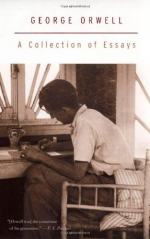
|
| Name: _________________________ | Period: ___________________ |
This test consists of 5 multiple choice questions, 5 short answer questions, and 10 short essay questions.
Multiple Choice Questions
1. In what type of print does Raffles appear?
(a) Newspapers.
(b) Books.
(c) Blogs.
(d) Magazines.
2. Is Donald McGill a real person?
(a) No.
(b) Yes.
(c) It depends on who you ask.
(d) No one knows.
3. McGill postcards say that a man can never win what with a woman?
(a) A poker game.
(b) A game.
(c) An argument.
(d) A fight.
4. When did "No Orchids for Miss Blandish" appear?
(a) 1969.
(b) 1949.
(c) 1959.
(d) 1939.
5. What breaks during Orwell's second beating?
(a) The belt.
(b) The wood.
(c) The stick.
(d) The cane.
Short Answer Questions
1. Most characters illustrated on McGill postcards are what?
2. The dirty postcards are a sign that people sometimes wish that society wasn't so what?
3. McGill's postcards are designed to get what?
4. Orwell believes that Kipling's poetry is remembered because of what?
5. In one example, Orwell translates a verse from what book into typical bad English?
Short Essay Questions
1. Why has bad English been successful in the political arena?
2. What does Orwell conclude about Dickens's solution for societal ills, at the end of the essay?
3. What does the subsequent investigation find regarding Orwell's shooting of the elephant?
4. How is the post-Hitler world view of law different from Kipling's?
5. What are the common writing errors that Orwell enumerates in his "Politics and the English Language" essay?
6. What does Orwell announce after his first beating?
7. Why is bad English an excellent vehicle for political speech?
8. What, according to Orwell, do the various deficiencies in Dickens's novels lead a person to conclude?
9. What do nearly all reviewers of Dickens's work agree on?
10. What describes the purpose of the semi-illicit postcards most newsstands carry?
|
This section contains 546 words (approx. 2 pages at 300 words per page) |

|




